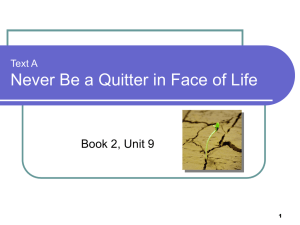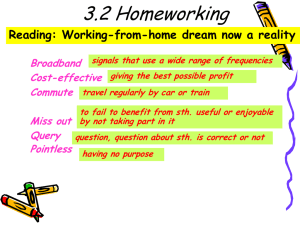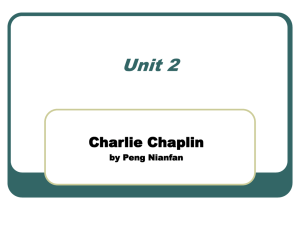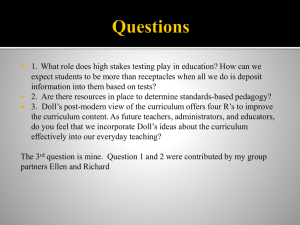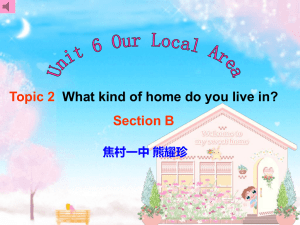Unit 4 A Doll for Great
advertisement
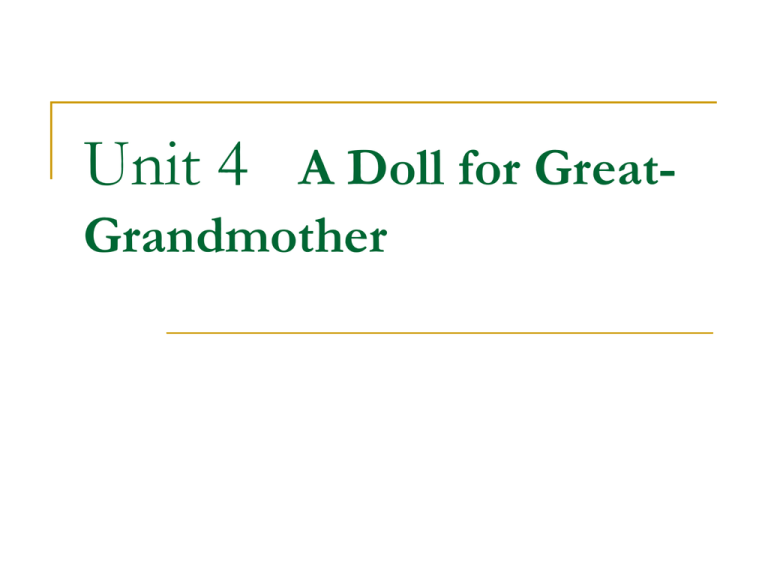
Unit 4 A Doll for GreatGrandmother Ⅰ.Teaching Aims Ⅱ. Teaching Contents Ⅲ. Teaching Time: Six class hours Ⅳ: Teaching Focal and difficult Points Ⅴ. Teaching Methods: Interactive Approach Ⅵ.Teaching Aids PowerPoint Blackboard Ⅶ.Teaching Procedure Ⅰ.Teaching Aims Section A: A Doll for Great-Grandmother 1. Let the students acquainted with some new words and good expressions: delicate; interpret; arouse; supply; inspire; recognize; go with; get through; move in; no way; specify; in touch with; resemble; put sth. together; crash; commission; 2. Teach the students to read between lines. 3. Teach the writing skill: A Paragraph of a General Statement Supported by a List of Details Ⅰ.Teaching Aims Section B: Care of the Elderly: A Family Matter 1. Teach the reading skill: Reading for the Main Ideas in Paragraphs 2. Enable students to grasp the main idea of the text Ⅱ. Teaching Contents Section A: A Doll for Great-Grandmother Lead-in Pre-reading Activities Background Information Structure of the Text Language Points Ⅱ. Teaching Contents Section B: Care of the Elderly: A Family Matter Reading skills Reading comprehension Language points Ⅳ: Teaching Focal and Difficult Points Section A: A Doll for GreatGrandmother 1. Analyze the structure of the passage. 2. Learn to read between lines. 3. Grasp several CET-4 key words Ⅳ: Teaching Focal and Difficult Points Section B: Care of the Elderly: A Family Matter 1. Ask students to summarize the text. 2. Enable the students to grasp the following expressions: in hands of; in other words; deserve; appreciate; occasionally; available; in contrast Text A A Doll for GreatGrandmother 1. Lead-in 2. Pre-reading Activities 3. Background Information 4. Work on Section A 5. Language Points 1. Lead-in ①. How old are your grandparents? Are they living alone or with a child of theirs? ②.When your parents grow old, do you want them to move in with you? State your reasons. ③. What can we do to help elderly people who feel lonely? 2. Pre-reading Activities Listen to the poem once and Work in pairs and discuss the following questions: What does the little girl say to her grandmother in the poem? How old are your grandparents? Are they living alone or with a child of theirs? Do you always try to communicate with your grandparents? Do you care to know what they really need? 2. Pre-reading Activities Listen to the short passage twice and decide whether the following statements are True or False. ①The Barbie Doll was first introduced in 1859 by a British toy company. ②As a plastic doll, the Barbie Doll was available in either 11.5-inch or 7-inch heights with the figure of a lovely baby. ③Ruth Handler and her husband noticed that their daughter, Barbara, enjoyed playing with adult female dolls more than with baby dolls. ④Barbie has been joined by family and friends, her boyfriend Ken in 1961; sister Skipper in 1965; and Becky, Barbie’s friend in a wheelchair in 1997. ⑤Today the Barbie Doll is mainly marketed to Europe, Latin America, Japan and China. 2. Pre-reading Activities Answers: ① (F) The Barbie Doll was first introduced in 1959 by a toy company in southern California. ② (F) As a plastic doll, the Barbie Doll was available in either 11.5-inch or 7-inch heights with the figure of an adult woman. ③T ④T ⑤ (F) Today the Barbie Doll is a global brand, with key markets in Europe, Latin America, and Japan. 4. Work on Section A A) Structure of the Text ( a method of analyzing the text structure is employed) Part 1 (Para. 1) : GG slowly began to fade after grandfather’s death. Part 2 (Para.2-8):GG recalled her childhood experience. Part 3 (Para. 9-16):Meagan and her mother managed to produce a close copy of the doll to GG as a Christmas present. 4. Work on Section A B) Raise some questions to make students grasp some detailed information in the text (question and answer method is used) 4. Work on Section A C) Questions and Answers Part 1 (Para. 1): Questions—What happened to the writer’s grandmother when her grandfather died? ---Why did the writer’s grandmother move in with the writer’s mother? ---How will you describe this extended family in one sentence? Answers—Her grandmother turned weak and lost interest in life. ---Because she couldn’t take care of herself anymore. ---It is a very large, loving one, consisting of 5 generations. 4. Work on Section A Part 2 (Paras. 2-8): Questions--How did GG’s baby sister break GG’s doll? ---What happened to GG’s baby sister years later? ---Why is the doll a very significant part in GG’s life? Answers---She reached up and pulled on the doll on the table. ---She died of pneumonia. ---Because it is a representation of many wonderful yet lost things together ; a precious gift; a dear sister; and a poor but happy childhood. 4. Work on Section A Part 3 (Paras. 9-16): Questions –What idea popped up in Meagan’s mind on their way back home? ---How did Meagan’s mother feel about this suggestion? ---How was Meagan feeling when she said “It’s for you” Answers—She suggested that they give her GG a new doll, exactly like the one GG used to have to cheer GG up. ---She felt proud of her loving and compassionate daughter. ---She must have been feeling very proud and expectant. 5. Language Points move in: take possession of a new home eg: You must come and see our new house when we’ve moved in. We moved out on Monday and the new tenants moved in on Tuesday. Collocation: move in 搬进 move out 搬出 5. Language Points arouse, awake, wake & waken 这些动词均有“唤醒、醒来”之意。 arouse 除表示一般的唤醒外,多作引申用。 awake 是正式用词,常指觉醒、警惕的状态,多作 不及物动词,多用于比喻,可用作表语形容词。 wake 是普通常用词,指真正的醒来,多作不及物 动词。 waken 是书面用词,多作及物动词,常用于被动态 和引申意义。 5. Language Points Directions: Fill in the blanks with the words above. Change the form where necessary. 1. You must awake to the fact that failure will mean disgrace. 2. My mother aroused me from sleep. 3. He woke up with a start when the door slammed. 4. We were wakened by a loud bang. 5. Is he awake or asleep? 6. It’s time you woke up to the fact that you’re not popular. 5. Language Points sacrifice: 1. n. offering of sth. valuable to a god; giving up of sth eg: Some cultures practise animal sacrifice to their gods. Getting rich isn’t worth the sacrifice of your principles. Translation: 她父母为她上大学在多方面做出了牺牲。 2. v. offer sth. to a god; give up sth. important for a particular purpose eg: Many teenagers sacrifice to their idols. He sacrificed his life to save a drowning child. Translation: 你赞成只要风度不要舒适吗? 5. Language Points recall: 1. vt. 1) summon back; order sb. to return to a particular place eg: The government recalled its ambassador when war was declared. 2) bring back to the mind; remember eg: Can you recall your school days? 2. n. 1) the act of summoning back eg: The recall of the general from abroad caused a scandal. 2) the ability to remember eg: She has an amazing recall of her early childhood. 5. Language Points Pattern: recall sb. (from … to …) recall doing sth. recall sth. recall that … CF: memorize, remember, recall & remind 这些动词均含有“记忆,记住,回忆”之意。 memorize 指有意识地下功夫把某事的整个细节都记在脑子里。 remember 含义较广,多指无意识地回忆起往事,也可指通过主观 努力去记忆。 recall 比remember文雅,指想方设法回忆已经遗忘之事。 remind 用作及物动词,表示“提醒,使想起”。 5. Language Points Directions: Fill in the blanks with the words above. Change the form where necessary. 1. The film reminded him of what he had seen in Germany. 2. He remembers every detail of that occurrence as though it happened yesterday. 3. An actor must be able to memorize his lines. 4. Please remind me to write to Dave. 5. He recalled his last evening with his fiancée whenever he felt depressed. 5. Language Points CF: break, crack, crush & smash这些动词均含“打破、弄碎”之 意。 break是常用词,含义广泛,多指猛然用力将坚硬物打破或损坏。 eg: He has broken the glass into pieces. crack多指因长期使用或经受压力,物体表面呈现裂纹、裂口或破裂、 裂开,但一般没成碎片。 eg: The tree cracked loudly and fell crush表示从外面往里或从上往下压,使其成为碎片或碎块。 eg: This machine crushes wheat grain to make flour. smash指突然而猛烈地重击某物,使之破碎或完全变形。有时指感情 受到打击。 eg; He smashed the headlights of the car when he hit another car. 5. Language Points exclaim: v. speak or say loudly and suddenly, because of surprise or other strong feelings eg; The evil stepmother of Snow White looked in the mirror, exclaiming in dismay at her appearance. He exclaimed that it was untrue. He could not help exclaiming at how much his son has grown. 5. Language Points in/out of touch (with): in/not in communication (with); having/not having information about eg: I’ll be in touch again towards the end of the week. I try to keep in touch with latest events by reading newspapers. 5. Language Points resemble: vt. look like or be like eg: Many college graduates discover that society does not at all resemble the way it is in their imagination. Leo Tolstoy once said all happy families resemble one another, but each unhappy family is unhappy in its own way. Pattern: resemble sb./sth. (in sth.) 5. Language Points make sure of sth./that: take action so that something will certainly happen eg: There aren’t many seats left for the solo concert; you’d better make sure of one. I’ll just make sure that the car has been locked. I think he has to go to the doctor to make sure it is not infected. 5. Language Points duplicate: 1. vt. copy exactly; repeat eg:Some say in a very short time, computers may not only duplicate the human brain, but far surpass it. 2. n. copy eg: Is this a duplicate or the original? The secretary was asked to prepare the contract in duplicate. 3. adj. identical; doubled eg: a duplicate set of keys a duplicate receipt/form 5. Language Points volunteer: v. give or offer (one’s services or help) willingly or without being paid eg; Many people volunteer to fund the establishment of Hope Primary Schools and enable dropouts to return to classrooms. Pattern: volunteer sth. volunteer to do sth. volunteer (sb.) for sth. n. person who offers to do sth. without being compelled or paid eg: Princess Diana’s special satisfaction came from volunteer work. 5. Language Points Collocation: an aid-the-poor volunteer 扶贫志愿者 volunteer labour 义务劳动 volunteer service 义务服务 5. Language Points cradle: 1. n. a small bed for a newborn baby; the place where sth. begins eg: The hand that rocks the cradle rules the world. The Yangtze River Valley is another cradle of Chinese civilization running parallel to, if not earlier than, the Yellow River Valley. 2. vt. hold gently as if in a cradle eg: She cradled the baby in her arms. He was cradled in luxury. 5. Language Points inspire: vt. 1. put uplifting thoughts, feelings or aims into eg: The trainer inspired the team to even greater efforts. 2. fill with creative power eg: The beautiful scenery inspired Li Bai to write his greatest poetry His passion for romantic literature inspired him to begin writing. 5. Language Points Pattern: inspire sb. to sth. inspire sb. to do sth. inspire sth. in sb. inspire sb. with sth. Text B Care of the Elderly: A Family Matter 1. Ask students to finish reading text B in ten minutes and doing exercises on page 115. 2. Language Points 2. Language Points Para 1: 1. in the hands of eg: The case was in the hands of the jury, and all we could do was wait. 2. occasionally ad. eg: Though we live quite apart from each other, we visit each other occasionally. 3. unfortunate a. eg: It was unfortunate that his mother died when he was just five years old. 2. Language Points Para 2: 1. average a. eg: The average man in the street would never doubt his good intentions. 2. look forward to eg: He was looking forward to working with the new manager. 3. eventually ad. eg: Eventually your child will leave home to lead her own life as a fully independent adult. 2. Language Points Para 3: 1. in other words eg: Your performance in the exam did not reach the required standard---in other words, you failed. 2. take on eg: My doctor says I’m too tired and has advised me not to take on any more work. 3. obligation n. eg: You can look at the books without any obligation to buy. 2. Language Points Para 4: available a. eg: I’m sorry, sir, those shoes are not available in your size. in contrast eg: In contrast to your belief that we will fail, I am confident that we will succeed 2. Language Points Para 5--6 appreciate v. eg: Peter always stood by me when I was in need, I’ll always appreciate that. potential a. eg: We are aware of the potential problems and have been measures to deal with them. arrange for eg: Since the airport is far away from here, I’ve arranged for a taxi already 2. Language Points consideration n. eg: The name of the murdered woman has not been released, out of consideration for her parents. in advance eg: The subject of the talk is announced a week in advance, but the name of the speaker is not. mutually ad. eg: Attempts to reach a mutually agreed solution had been fruitless.

